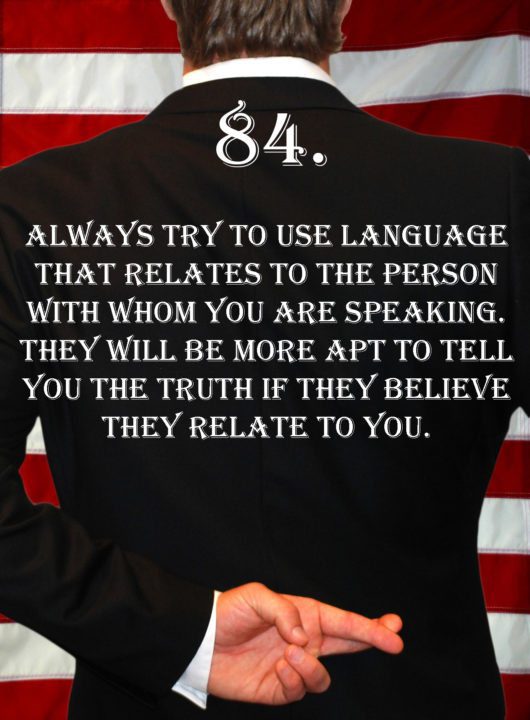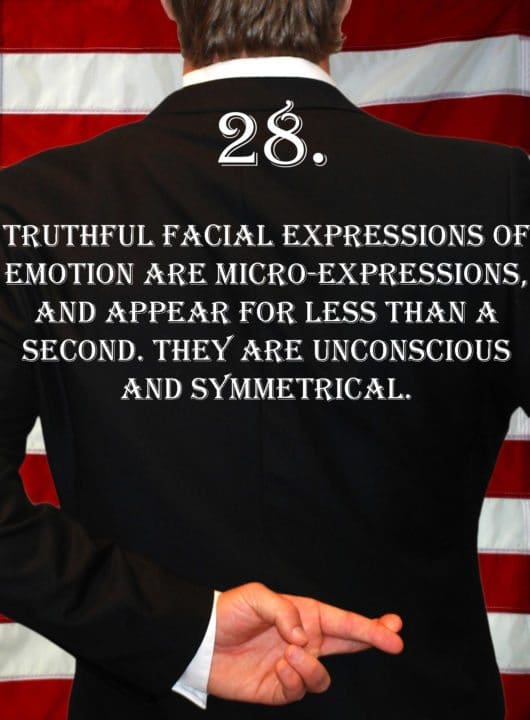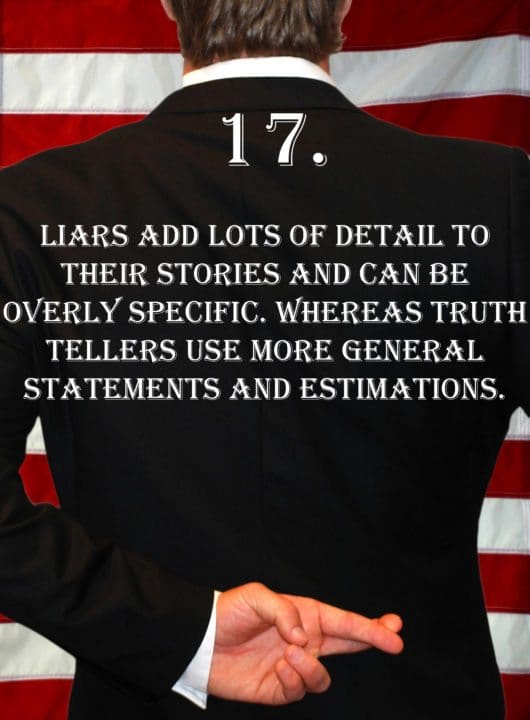
Deception Tip 84:
Always try to use language that relates to the person with whom you are speaking. They will be more apt to tell you the truth if they believe they relate to you.
Listen To The Podcast!
E84 – Relating Language – Deception Tips Podcast – Click Here To Subscribe
Podcast Transcript
Hello and welcome to the Deception Tips podcast where you will learn amazing cues to detect deceit that will help you read people like never before. I’m your host Spencer Coffman, let’s get started.
Hello and welcome to Deception Tip episode number 84. Thanks for tuning in once again to the Deception Tips podcast, we’re really learning all kinds of stuff about how to read people and detect deception so that you will make sure that you will never be taken advantage of by lies again. I really encourage you to take a look at all of the other materials that we have available out there.
I’ve got the Deception Tips blog on spencercoffman.com, I also have a Deception Tips website where I have each of these podcast episodes and all of the Deception Tips videos put there. We also have the Deception Tips videos on the Body Language YouTube channel.
In addition, I have the Deception Tips eBook and also The Deception Tips Revised and Expanded Edition. Who can forget A Guide to Deception, the book that started it all? So again, I encourage you to check out all of those great resources so that you will be more apt to know when someone is lying to you.
Last time, we spoke about a sign of deception that wasn’t a sign but it was a deception tip on how you can best frame your conversations and your questions so that you will be able to get the answers you need. Mainly, the important thing was having an agenda, you need to have a specific and clear path that you are trying to discover, something you need to know.
You need an agenda, you have to set your mission and hone in your sights, it’s got to be laser-focused. Then you can target your questioning around whatever it is you are trying to discover.
That way, when you get involved with these people who are trying to find loopholes and who really liked to talk or change the subject or turn the tables and start asking the questions themselves.
You will be able to defend against that because you know exactly where you want to go, and you’ll be able to steer the conversation right back toward your agenda. That’s very important, you really need to know exactly what’s going on, you need to be in control of the situation.
It doesn’t matter if you have to take the scenic route or if there are a few detours along the way. What matters is that you are finding the answers you need and you’re getting to the bottom of the situation.
Today, we’re talking about another language-related or interrogation-related technique. This is something that you will need to know when you’re asking people these questions or when you’re trying to find the truth. In addition, it’s also a great way to get whoever you’re speaking with to open up to you.
They’re going to open up to you, they’re going to want to talk to you because they feel some kind of connection with you. So, getting them to feel that way and to make this connection is what’s important.
If you can start to do that then these people who you need to get the truth from, they’re going to start to talk to you more. Remember they’re very uncomfortable, they are under a lot of stress and tension from telling these lies, they want to feel relief, they want to feel comfortable.
If you can relate to them and you can build that rapport and get them to like you, to feel comfortable with you then they are going to be a lot more apt to tell you the truth.
So, here it is, this is Deception Tip number 84. Always try to use language that relates to the person with whom you are speaking, they will be more apt to tell you the truth if they believe they relate to you. Here it is again, Deception Tip number 84. Always try to use language that relates to the person with whom you are speaking, they will be more apt to tell you the truth if they believe they relate to you.
That was a long tip, it could have been confusing to you, I tried to read it in a couple of different ways. That way, no matter what your learning style is, you will be able to understand it and you’ll be able to get it, but we’re going to break it down. Always, this is always, there’s no ifs, ands, or buts here, this is always, you need to always use language that relates to the person.
How do you use relating language? Well, it’s very simple, you can either find things that you have in common with them, such as if they bring up like a dog, you may say, you know, I have a dog too, its name is Fido. I really love it, it’s a rat terrier or something like that then they’re going to relate to you because they have a dog too. Wow, you both have a dog.
It’s something really simple but it really helps build rapport or if they say they’ve got kids, maybe you have kids. Oh, the mortgage payment is something terrible, they hate it.
Oh, you hate your mortgage payment too, or man, those insurance costs keep going up. You know what, you’re angry about those rising insurance costs as well, you guys have something in common.
Now you don’t need to have anything in common with them but they need to feel like you have something in common with them. If they have something in common with you, it really doesn’t matter, they don’t want to be like you.
But if you have something in common with them and they feel like that, like you are like them, then they will open up to you, if they feel like you guys are the same.
You know for certain you guys aren’t the same but they believe you are, now they’re going to open up to you, they like you. So, always try to use the language that relates to the person that you’re talking to, you’ve got to be able to relate to them. Again, it could also mean speaking in a relating term, so use more inclusive terms when you’re talking with them.
You could say our or we or inclusive terms, a lot of people do this and it sounds kind of stupid. They say, ‘how are we doing today’ when they’re talking to you when really they should say, ‘how are you doing today’? They’re trying to include everybody in there to make it more inclusive, to use relating language.
If you use stuff like that, don’t say ‘how are we doing today’ because that’s stupid. Use other things such as, ‘Oh yeah, we’re going to go down there later’ or ‘as soon as we finish up talking here’ if you’re saying it to someone else.
Use language that includes them to make them feel like it’s you and them, you guys are an inseparable pair, that is how you can use that relating language.
They will be more apt to tell you the truth if they believe they relate to you. When they believe that you have something in common with them and that they have something in common with you, they are going to open up to you. So, it goes two ways, they need to believe that you are like them because that’s more of the superiority complex that you are like me. We’re not so different, you and I, you hear that from criminals.
If they believe they relate to you like maybe you’re the cop, you’re the white knight or whatever the case is and they relate to you, they’re going to be like, ‘you know, I’m a pretty good person, I’m a lot like you’, even though none of it may be true. If you relate to them and they relate to you, I know it sounds like that’s one and the same but it’s not, it’s a mentality.
They’re looking up to you and they need to think you look up to them, kind of like that. If that can happen, they will be a lot more ready to start to talk to you and open up to you. We’re going to talk a lot more about why this is and how it works coming up right after this.
How about having a handy guide filled with quick tips to detect deception? Now you can. Deception Tips is an eBook with 101 cues to detecting deception. Grab your copy today at spencercoffman.com or any major retailer.
Welcome back to Deception Tip episode number 84, where we are talking about Relating Language. Relating Language is something that you need to use when you’re speaking with other people because it makes them feel like you and they have something in common, it allows them to open up to you.
If they’re like-minded and you’re like-minded and you guys think you have stuff in common, you’re going to want to talk to them a little bit more. Notice that I incorporated a little bit of relating language when we came back right after the break, I said, ‘where we are talking about relating language’. We’re not talking about anything, I’m talking and you’re listening.
So, I’m talking at you, I could be lecturing or preaching or any of those terrible words, but I said no, we are talking about it. Why? Well, even though we’re not really having a conversation, we kind of are. I’m talking to you and you are thinking about the things I’m saying and you are having sort of a conversation with me in your mind.
You’re speaking back to me in your mind, you may even be talking out loud. I might say something stupid and you might laugh at me or you may talk back to me. I remember when I was a kid, heck, my dad still does it, he would always shout at the TV. Politics news or something and he’d ‘you big dope’ or he’d call things or say things and talk to the TV, we talk to the people on the TV.
That doesn’t really make any sense because they can’t hear you, you might be talking to me like, oh, my dad did that or I do that or my husband does that, but I can’t hear you, but you’re still having that conversation.
We are having a conversation, you can relate to me and I’m relating to you. Why? We’re both interested in deception, we’re both interested in body language and understanding what people are really saying.
We have things in common, so if we saw each other in person, we would automatically already feel like we have some rapport because we can start talking to people.
In fact, if you meet another person that listens to the Deception Tips podcast, you’d probably have something to talk about, wouldn’t you? That’s the only thing you have in common but you have something to talk about, which is going to open the door for you to talk about other things.
Pretty soon, you’ll be talking about work, family, kids, stress, all kinds of stuff, that is the power of being in relation with people. I don’t say relationships, I mean relation.
So, if you are interrogating someone or you’re asking them questions or you need to find information, having that rapport building or showing that you guys have something in common can open the door for a lot of other information that you will need.
You will need it, it’s important stuff, it’s things that you need to find out or you want to find out, it leads to the truth. They may be lying through their teeth on a lot of different areas but you can show them that you guys have certain things in common and that you start talking about those things and you start asking other questions kind of deeper and deeper.
It’s like an onion, you’re peeling back one layer at a time, pretty soon, you’re going to get to the core. You’re going to get to the heart of the matter, the beginning of the situation and you’re going to understand what is really going on. Layer after layer you’re peeling back that avocado or artichoke and you’re getting in there to the pit or to the heart of the matter.
You’re getting there. Why? Because you guys have something in common and if you have things in common, you’re going to talk about them. You’re going to open the door to other things, you let them ask some questions, and you show them that you’re interested in some things that they’re saying. We’ve talked about this before, how important it is to make them feel like they are being believed.
Why? Because if they feel like they’re believed, they’re going to relax a little bit, they’re going to be less tense. Remember there’s a lot of stress and tension involved in telling a lie and a big part of that stress and tension is about whether or not the person they’re speaking with is going to believe their lie. So, if you just pretend to believe them and then let them keep talking, eventually they’re going to come to the truth.
In addition, you don’t have to have anything in common with these people, you could engage in a little bit of deception yourself. Obviously, if you’re working with your friends or family or your coworkers or your kids, I don’t recommend this.
You should not have deception or use deception in order to get the truth because those are the people in your life, they matter to you and they matter to your relationships.
However, if it’s something like you’re a police officer and you need information on a suspect, you can very well pretend that you have a dog as they do.
Yeah, you know what, your insurance sucks even though you really like your insurance or whatever the case may be. You can be a little bit deceptive to get the truth from them because that truth needs to come out, it matters, it could save lives.
However, if you need to get the truth from your kids as to who started the fight, lying to your kids in order to get them to tell you the truth, ‘I’ll give you ice cream later if you tell me the truth’. ‘Oh, I just said that’, that’s not good, you should never engage in deception in order to get the truth unless it is a higher state unless something really needs to happen.
If it’s high stakes lies, terrorist attacks, assassinations, murders, catching the bad guy, then deception can be used and should probably be used to gain justice. Again, though, politics get involved, money gets involved, bribery, agenda, the mayor breathing down someone’s neck or the governor or captain, there could be all kinds of problems.
Then it’s not just any way because now it’s just a bunch of nothing, you know what I was going to say, there’s a bunch of that and it’s not right. Therefore, you need to make sure that whenever you’re trying to find the truth you are still being just and righteous and moral about it all in that effort to find the truth. Relate to the person and they will be a lot more apt to open up to you.
I want to thank you for listening to this week’s episode of the Deception Tips podcast. I hope that you’ll share it with your friends, subscribe to the feed, check out the deception tips video, the blog and take a look at the books I have available and, as always, tune in next week for a new deception tip.
Video Transcript
Hey guys, my name is Spencer Coffman, thank you for watching the Deception Tips videos. They’re all about teaching you how to read people and detect deception so that you will be able to tell if someone is lying to you. Today, we are going to talk about a cool tactic that you can use when you are in everyday general conversation and when you are in a more serious conversation.
When you may be interrogating someone or when you are trying to find the truth in someone, whether you’re asking them a question or whether it is a formal, police-type interrogation situation. This is something you can do to get that person to be more apt to tell you the truth.
So, here it is, this is Deception Tip number 84. Always try to use language that relates to the person with whom you are speaking. They will be more apt to tell you the truth if they believe they relate to you. So, this is important because there are a couple of different things here, always try to use language that relates to that person.
For example, if this person is in construction, you’re going to want to talk to them in some terms that are related to that industry. If they’re a banker, maybe you’re going to use analogies that go towards finance or money or banking. You want to be relating to them, you’re going to use language that relates to them.
What this does is it helps them to understand more of what you’re trying to get at, what you’re talking about. For example, if someone is a doctor and someone else is a carpenter and the doctor is using an analogy on doing some kind of bypass, the carpenter is not going to understand that.
If the carpenter is using an analogy on framing up a house, the doctor may not understand that. So, using language that relates to that person, what they are and who they are is going to be more effective in getting them to talk to you than if you’re using things that they don’t even understand.
The second part of that is they will be more apt to tell you the truth if they believe they relate to you. So, the first part was you relating to them, use language that relates to them then they will be more apt to tell the truth if they believe they relate to you. So, why is it important? Why can’t they believe you relate to them? Well, if they believe that you relate to them then it doesn’t matter.
They need to think that they are like you because if they believe that you’re like them it’s not going to help anything. They’re going to be like, well, I’m justified in this position, you’re exactly like me, you would tell a lie in my position too. But if they believe that they are relating to you, it’s almost like they’re looking up to you.
So, now they’re going to want to tell you the truth to impress you or to satisfy the fact that they’re looking up to you. They look up to you, they respect you, they want to give you what you want, so if they believe that they relate to you, that’s a good thing. To do that, you need to talk to them in their own language, get them to understand.
Maybe you need to shoot the breeze with them for a little bit and lower some of those defenses or knock down those barricade walls so that they believe that you guys are developing a little bit more rapport, that you guys can converse with one another easily. Now they will be more apt to tell you the truth because they believe that you guys are like each other, you’re similar, you have some things in common.
So, develop those commonalities, if they talk about a kid or their kid, maybe you bring up a kid. If they talk about a certain situation, something that happened to them, maybe something happened to you, things like that. Be careful that it’s not all about you because you’re trying to get some information from them. So, if you dominate the conversation, telling your whole life story, probably not going to help.
Therefore, use language that relates to them and then get them to think that they relate to you and you will be golden in terms of conversation of getting the truth from them. It comes down to just being normal, being a human being, talk to them a little bit, show him a little bit of respect, get them to lower their defenses and lower those guards. Then start asking them these questions and build from there then you’ll be able to really hit it home.
So, if this is your first time watching these videos, I’d love to have you subscribe to the channel on YouTube. Feel free to comment with any questions you may have as well. Also, if you’d like some more information, we have books, podcasts, and blog posts all available on spencercoffman.com that are dedicated to teaching you exactly what every body is really saying.
Until next time.






